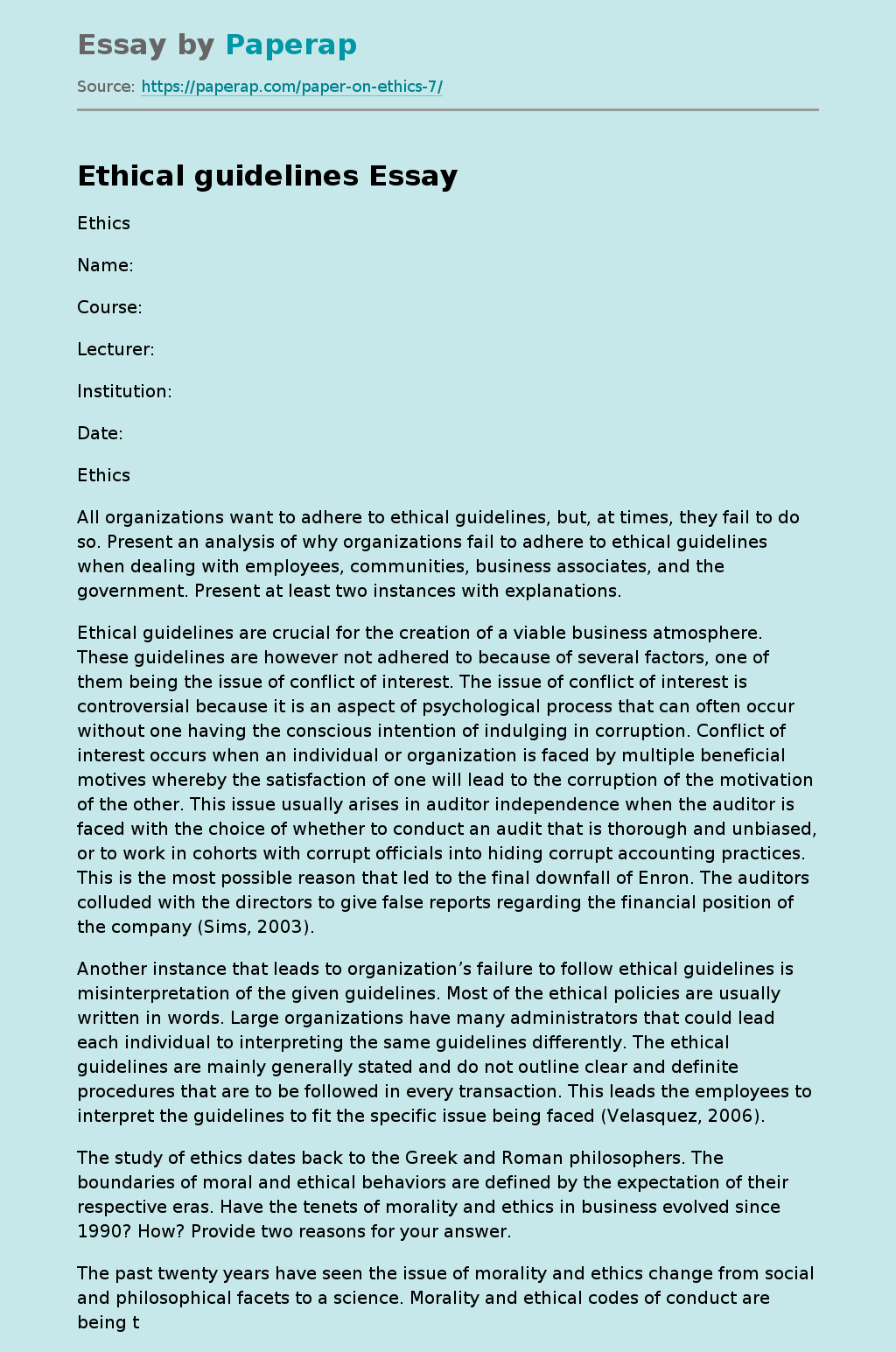Ethical Guidelines
The following example essay on “Ethical Guidelines” Present an analysis of why organizations fail to adhere to ethical guidelines when dealing with employees, communities, business associates, and the government.
All organizations want to adhere to ethical guidelines, but, at times, they fail to do so. Ethical guidelines are crucial for the creation of a viable business atmosphere. These guidelines are however not adhered to because of several factors, one of them being the issue of conflict of interest. The issue of conflict of interest is controversial because it is an aspect of psychological process that can often occur without one having the conscious intention of indulging in corruption.
Conflict of interest occurs when an individual or organization is faced by multiple beneficial motives whereby the satisfaction of one will lead to the corruption of the motivation of the other. This issue usually arises in auditor independence when the auditor is faced with the choice of whether to conduct an audit that is thorough and unbiased, or to work in cohorts with corrupt officials into hiding corrupt accounting practices.
This is the most possible reason that led to the final downfall of Enron. The auditors colluded with the directors to give false reports regarding the financial position of the company (Sims, 2003).
Another instance that leads to organization’s failure to follow ethical guidelines is misinterpretation of the given guidelines. Most of the ethical policies are usually written in words. Large organizations have many administrators that could lead each individual to interpreting the same guidelines differently.
The ethical guidelines are mainly generally stated and do not outline clear and definite procedures that are to be followed in every transaction. This leads the employees to interpret the guidelines to fit the specific issue being faced (Velasquez, 2006).
The study of ethics dates back to the Greek and Roman philosophers. The boundaries of moral and ethical behaviors are defined by the expectation of their respective eras. Have the tenets of morality and ethics in business evolved since 1990? How? Provide two reasons for your answer.
The past twenty years have seen the issue of morality and ethics change from social and philosophical facets to a science. Morality and ethical codes of conduct are being taught in business schools the world over. Due to the changing nature of the business environment, the ethical guidelines and tenets have changed to accommodate the changing environment. The society’s expectations on the conduct of the corporate sector have not changed over the years.
The society still expects that they get value for their money. The moral values of honesty, integrity and quality have remained intact. However, moral conduct has changed as greed and the cut-throat competition evident in the modern business arena has prevailed. The high expectation set on company managers to perform has led them to bend the rules to device ingenious tactics and devices to boost their performance levels. This has led them to compromise on their integrity and moral conduct to meet with the high expectations (Rest, 1979).
One example is the Enron saga where the employees were constantly expected to raise their standards. The employees were put in a situation where the addition of value is set as priority at the expense of ethics and morality. This also led to the creation of an atmosphere where the rules were constantly being broken to meet with the standards that were continually being raised. There are other cases where companies have been known to source for materials elsewhere to keep up with the rising competition. One such case is where Wal-Mart continually asserted that they dealt in American products whereas evidence showed that they had for a long time been obtaining cheap materials from China (Bartlett and Glinska, 2001).
References
- Bartlett, C. A. and Glinska, M. (2001). Enron’s Transformation: From Gas Pipeline to New Economy Powerhouse. New York, NY: Harvard Business School Press.
- Rest, J. R. (1979). Development in Judging Moral Issues. Minessota: University of Minnesota Press.
- Sims, R. R. (2003). Ethics and Corporate Social Responsibility: Why Giants Fall. San Antonio CA: Greenwood Press.
- Velasquez, M. (2006). Business Ethics: Concepts and Cases, 6th Edition. New York, NY: Prentice Hall.
Ethical Guidelines. (2019, Feb 02). Retrieved from https://paperap.com/paper-on-ethics-7/

